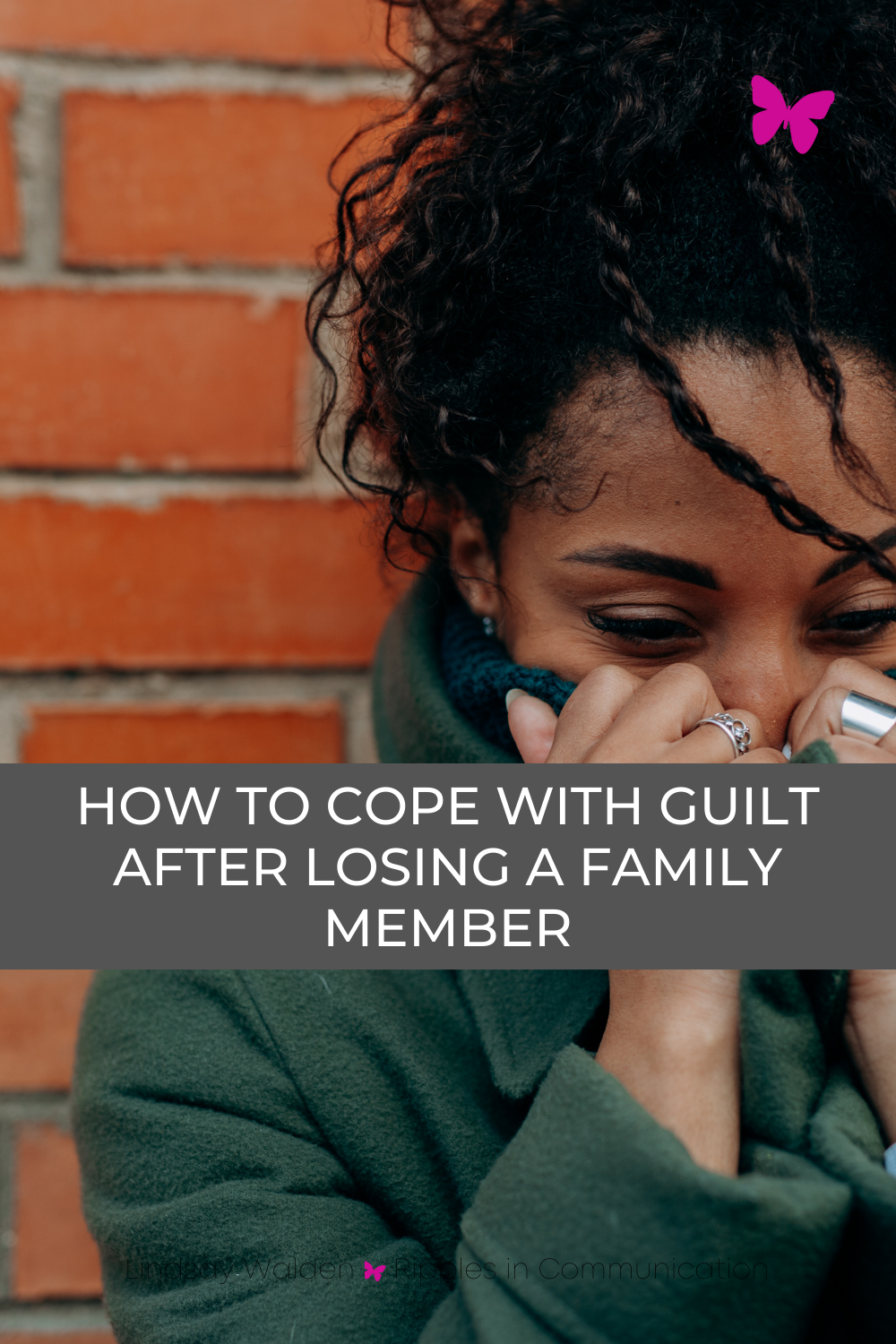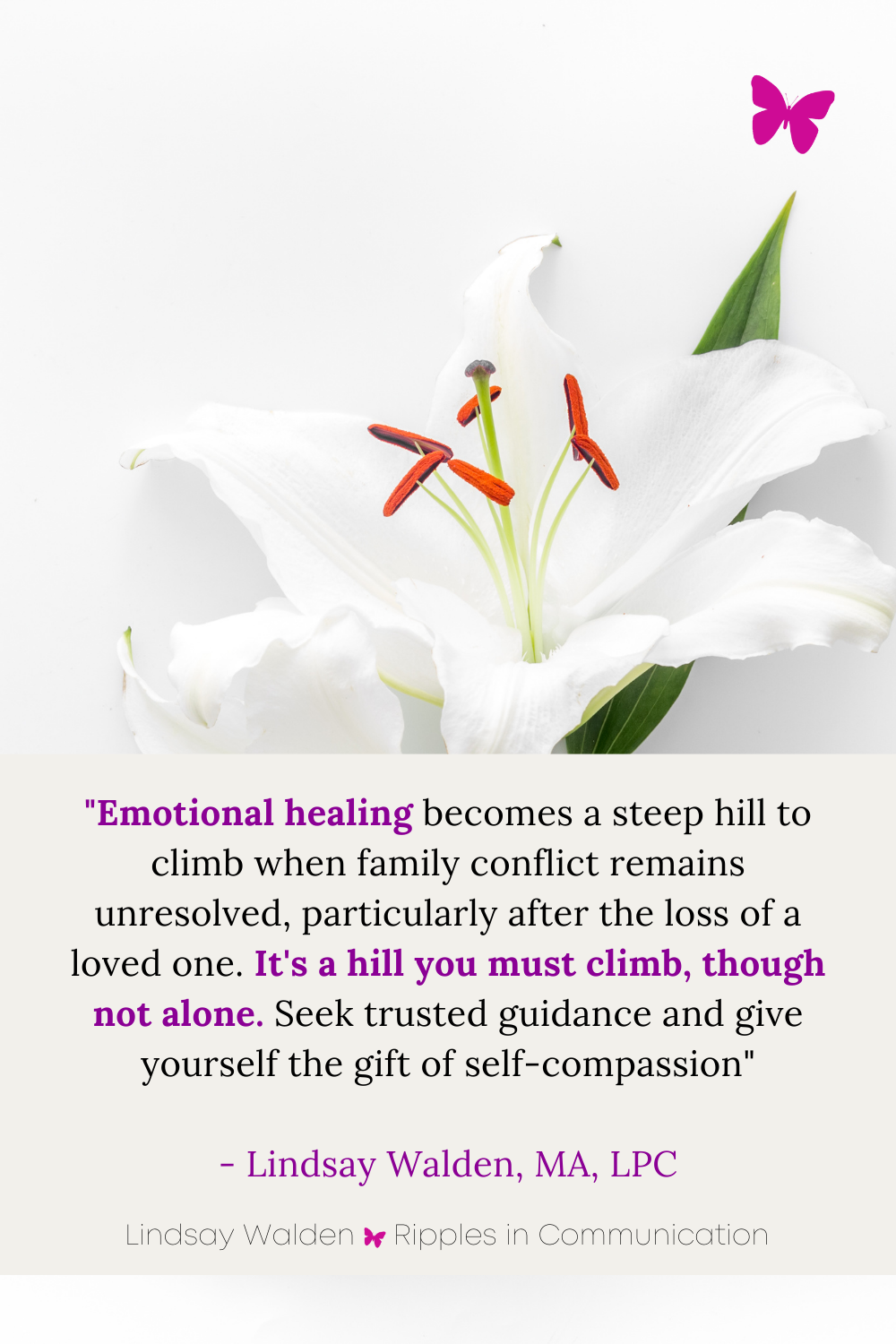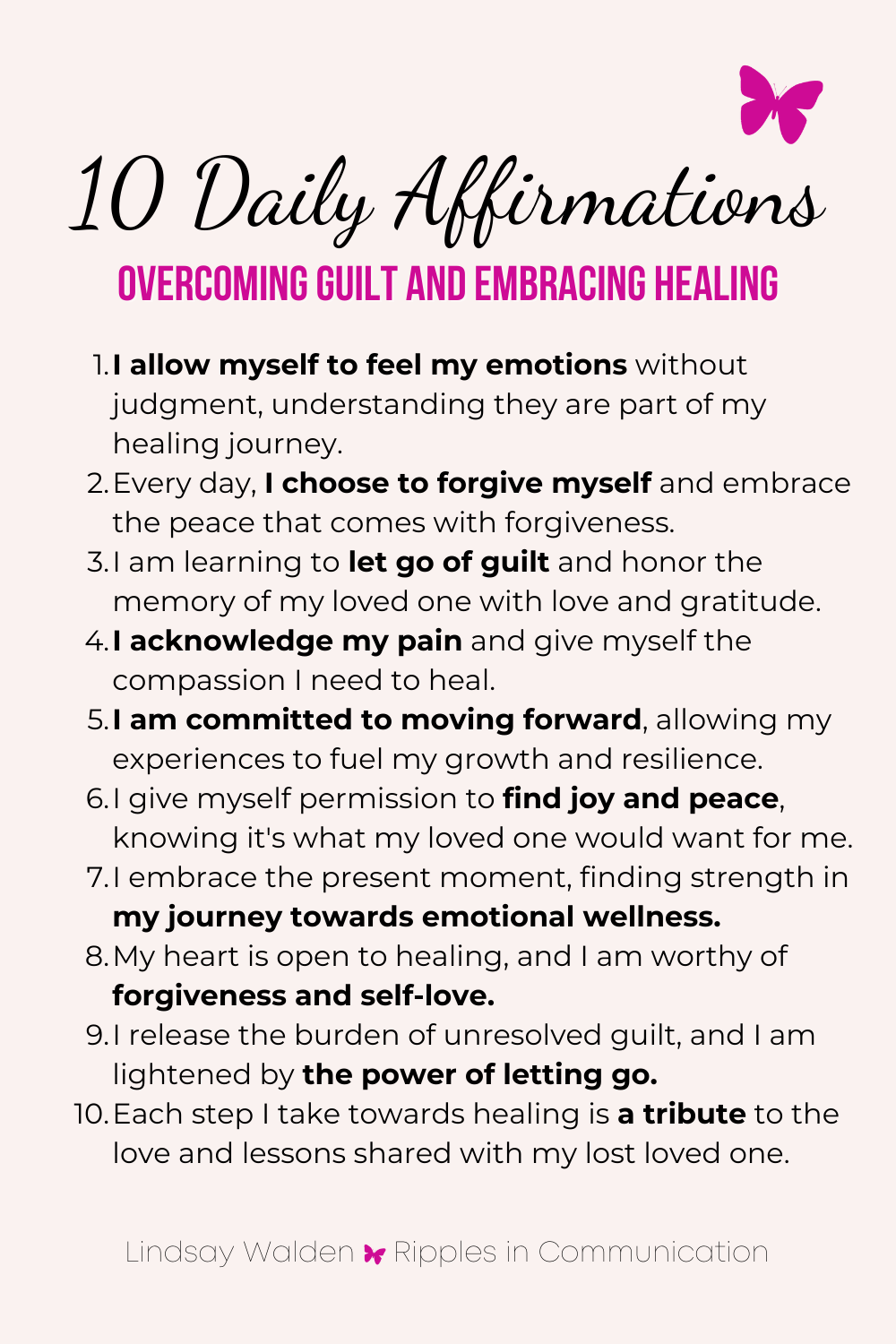How To Move On From Guilt After Losing A Family Member
Carrying the weight of unresolved guilt after the loss of a family member marks a complicated journey of grief and self-reflection. Many of us have faced moments where misunderstandings or conflicts were left unaddressed, only to be magnified by the finality of death. This particular form of guilt gnaws at our well-being, often leaving us feeling stuck in a cycle of what-ifs and if-onlys. It prompts a crucial need for emotional healing, allowing us to navigate through our feelings and find a path towards resolution and peace. Acknowledging and addressing this guilt isn't just a step towards personal growth; it's a leap towards freeing ourselves from the chains of the past, enabling us to move forward with lighter hearts.
Key Takeaways:
Family conflict and guilt can deeply affect our emotional wellness, needing our attention for healing.
Writing letters to deceased loved ones helps in processing emotions, serving as a cathartic step towards letting go.
Self-compassion becomes essential in navigating through grief stages, promising growth and healthier relationships ahead.
The Complexity of Family Conflicts and Loss
Family dynamics are complex. They weave through our life journey with experiences of joy, sorrow, and sometimes unresolved issues. At the heart of such intricacies often lies the struggle for open conversations and mutual understanding. Emotional healing becomes a steep hill to climb when a family conflict remains unresolved, particularly after the loss of a loved one. We carry the weight of guilt, grief, and a plethora of emotions that seem to have no outlet. This burden can be heavier if those feelings – anger, sadness, guilt – stem from issues that we never had the chance to resolve with the departed. Emotional wellness, therefore, demands that we navigate through these layers of grief and self-reflection, finding a way to let go, move forward, and eventually attain catharsis. It is a personal journey of growth, one that requires courage but leads to a stronger, healthier relationship with oneself and those around us.
Acknowledging Your Feelings Without Judgment
I understand how overwhelming it can feel having a maelstrom of emotions like guilt, grief, and anger swirling within you, especially after losing a family member with whom things were left unresolved. It's crucial you recognize that these feelings are valid. You have every right to experience them without judgment. This acknowledgment is the first, vital step towards your path of emotional healing. Remember, granting yourself permission to navigate through all stages of grief and self-reflection is essential. It aids in processing emotions, thereby fostering personal growth and the development of healthier relationships moving forward. Whether it is through open conversations or private contemplation, the journey towards catharsis, letting go, and ultimately, self-compassion, begins with confronting these emotions head-on.
Explore effective ways to manage the heavy burden of guilt following the loss of a family member.
The Power of Writing: Communicating With the Departed
I often suggest a unique method for bridging the gap between unresolved emotions and peace. This involves writing a letter to the deceased loved one. Through this exercise, you engage with your emotional healing, offering a stream of consciousness to those gone but not forgotten. It's a powerful step in managing your grief, family conflict, and guilt. This process facilitates a private conversation that was never possible in reality. It allows for the expression of everything left unsaid, from deep-seated remorse to lingering anger and profound love.
In this task, self-compassion becomes your guiding light. You pour your heart out, acknowledging your feelings without judgment. This act can serve as a cathartic release, propelling you toward the next stages of grief. It carves a path for moving forward, letting go of what weighs you down, and embracing emotional wellness. Ultimately, this practice could lead you to a place of catharsis, where personal growth and healthy relationships flourish anew.
Deciding on Your Letter's Final Resting Place
Once you've poured your heart and penned your feelings, deciding what to do next can be a profound step in your journey towards emotional healing. You possess several avenues to honor this cathartic process, each serving as a symbolic gesture of release and closure. Reading the letter at a loved one's graveside allows you a moment of intimate farewell, enveloping you in a sense of connection and peace. For others, destroying the letter—perhaps by tearing it into shreds or safely burning it in a controlled environment—acts as a vivid act of letting go, as the physical form of your words dissolves, so can the weight of your grief. These actions punctuate your path through grief stages, guiding you towards self-compassion and, ultimately, self-reflection. Through this process, emotional wellness lies within grasp, nurturing seeds for personal growth and healthier relationships ahead.
Considering the Source: Understanding Their Perspective
Understanding their perspective might feel challenging. They acted based on beliefs and experiences unknown to us now. You have carried guilt and grief, a weight that often seems unbearable. Yet, it's crucial for your emotional healing to consider their position. They were not perfect, shaped by their own trauma and personal growth. Acknowledging this does not negate your pain but paves a path towards compassion.
Though their actions or words hurt you, reflecting on their possible motivations can offer insights. We seldom know the complete story behind someone’s behavior, especially in matters of family conflict and unresolved issues. Granting ourselves the grace to accept this uncertainty helps in processing emotions more healthily. It invites empathy into our hearts, enabling us to let go and move forward with a lighter spirit, liberated from the chains of past disputes.
This powerful quote reminds us of the challenges and eventual triumphs on the journey to emotional healing after family loss. Let's navigate this path together.
Navigating Through the Layers of Grief
Grief envelops us in layers, each distinct yet interconnected. Family conflict, guilt, unresolved issues, and loss weave through these layers, making the journey through grief complex. It's crucial for you to understand that feeling a wide range of emotions is not only normal but necessary for healing. You might find yourself oscillating between anger and sadness, guilt and release, each emotion a vital step toward emotional wellness.
Allowing yourself to fully experience these stages of grief, without judgment or haste, is essential. The process of emotional healing demands patience and self-compassion. Whether it’s through writing letters to the deceased, engaging in self-reflection, or quietly contemplating the nature of your relationship, each act of processing emotions helps peel back the layers of grief. As you navigate these waters, remember that moving forward and letting go doesn't mean forgetting—it means forging a path toward a future where your memories inform your growth, rather than dictate your pain.
Granting Yourself Permission to Heal
Healing from guilt requires self-compassion, a trait we often extend to others but withhold from ourselves. It's crucial to understand that healing is a journey, not an overnight process. Emotional wellness comes from acknowledging your grief stages and allowing yourself the time needed to navigate through them. This journey towards emotional healing involves granting ourselves the patience to process complex emotions like grief, guilt, and anger.
We might have unresolved issues, communication problems, or intimacy fears that compound our feelings of guilt. By focusing on personal growth and trauma recovery, we foster healthier relationships with ourselves and others. It's about moving forward, letting go of what we cannot change, and focusing on what we can influence - our emotional response and our path to catharsis.
In essence, healing from family conflict and the grief of loss takes courage. It's an act of self-help and self-reflection that propels us toward letting go and reclaiming our emotional freedom. Remember, it's okay to seek out help in navigating these waters, whether through writing letters to the deceased or open conversations with trusted individuals.
A Path Forward: Reclaiming Your Emotional Freedom
You have journeyed through the thickets of grief, navigated the complexities of family conflict, and confronted the tangled mass of unresolved issues head-on. Now, I urge you to embrace a path forward that leads to reclaiming your emotional freedom. This journey, weighted with the burdens of guilt and grief, has taught us the invaluable lesson of self-compassion—a salve for our deepest wounds.
In the course of our exploration, we delved into the therapeutic power of penning letters to the departed. This cathartic practice has offered a means to express the emotions that once lay dormant within us—anger, guilt, or sorrow—thereby fostering an intimate process of healing. Moreover, we've recognized the importance of processing these emotions, traversing the stages of grief with an open heart, and understanding the actions of those no longer with us from a place of empathy.
Let this article serve as a guiding beacon towards personal growth, intimacy issues resolution, and the cultivation of healthy relationships. By looking inward and reflecting on our own emotional wellness, we've ventured on a journey toward letting go and moving forward. The practices detailed herein—rooted in honest, open conversations with ourselves and others—underscore the transformative power of self-help and emotional healing.
As you stand at the precipice of new beginnings, grant yourself the permission to heal. Remember, the steps you take today towards resolving feelings of guilt or grief are not just about overcoming past traumas; they are foundational to building a thriving and intimate relationship with yourself. This is your moment to reclaim your emotional freedom and step into a realm of endless possibilities, where you are no longer defined by the past but empowered by the courage to forge ahead.
Navigate the path of healing from guilt after losing a family member with these empowering daily affirmations. Embrace forgiveness, self-compassion, and the journey towards emotional wellness. Let these affirmations guide you towards peace and personal growth.







